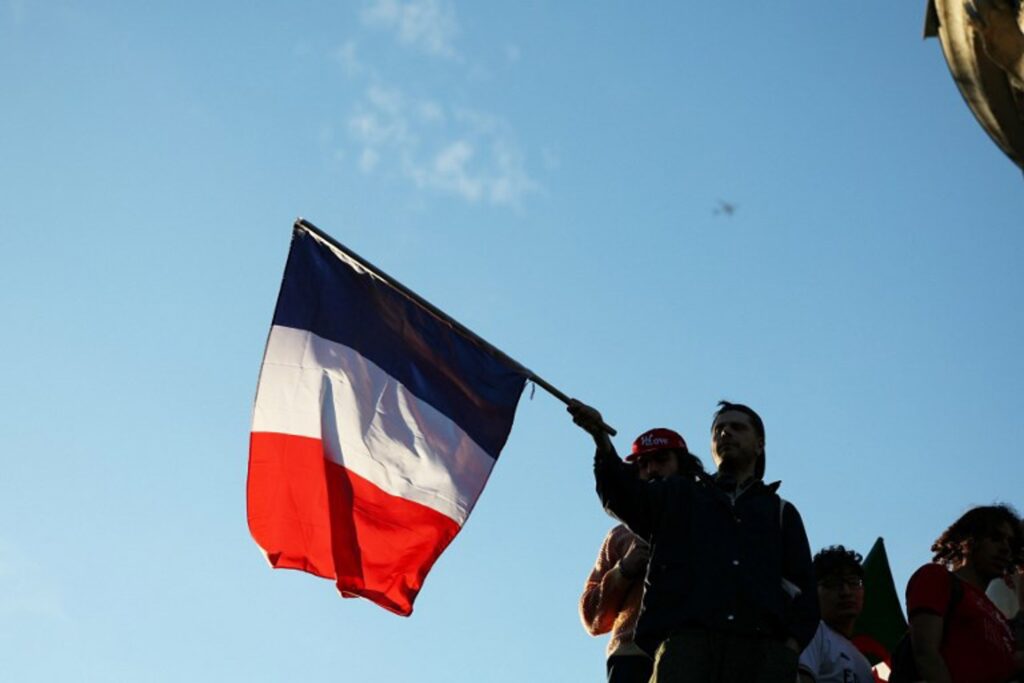In an unexpected victory, the left-wing bloc New Popular Front (NFP) won in the second round of France’s parliamentary elections on Sunday.
Despite the left having the most seats, no party received a majority, bringing France into the unknown territory of a hung parliament and the need to form a coalition. Macron will now most likely need to "co-habit" with a prime minister who is from a different political affiliation, a rare occurrence in French politics.
The left-wing alliance NFP won the most seats, ahead of the centrist bloc and the RN, upending widespread predictions of a clear victory for the far-right party in the second round on Sunday.
These predictions had been fuelled by Marine Le Pen's far-right National Rally (RN) had triumphed in the first round of the French parliamentary elections on Sunday 30 June.
The victory was greatly helped by centrists and the left uniting to form a so-called "Republican front" which saw candidates across France dropping out of three-way races against Le Pen’s party.
The joint platform NFP, including La France Insoumise, the Socialist Party, the Greens and the Communist Party, came in first, securing 182 seats in the country's Assemblée Nationale (National Assembly). It now constitutes the largest faction within the newly formed French parliament.
France, snap national parliament election, second round:
Final results (seat distribution) NFP-LEFT|G/EFA|S&D: 182 (+51) Ensemble-RE: 168 (-76) RN and allies-ID: 143 (+54) LR/Divers droite-EPP: 60 (-11) Divers gauche-*: 13 (-9) Divers centre-*: 6 (+2) Regionalists-*: 4 (-6)… pic.twitter.com/dcBvgMD9d6 — Europe Elects (@EuropeElects) July 7, 2024
The leftist bloc campaigned on raising the monthly minimum wage, lowering the legal retirement age (the increase resulted in months of protests across the country last year), reintroducing a wealth tax and freezing the price of energy and gas.
Meanwhile, President Emmanuel Macron’s centrist alliance, Ensemble, won 168 seats. This tally includes 98 seats for Renaissance, 34 for MoDem, and 26 for Horizons representatives. Lastly, the far-right RN, led by Jordan Bardella, secured 143 seats, coming in third place, while The Republicans will represent 45 seats.
Challenges ahead
Combining the seats won by NFP and other left-leaning parties, the total rises to 195 seats – but this is still not enough to form a majority in the National Assembly, which has 577 seats in total.
As a country that is not used to forming coalitions, France now faces a hung parliament. No governing coalition seems likely to be formed immediately as many compromises will be needed for a circulating broad government alliance between a part of the left, the centre, and some right-wing MPs.

Founder of left-wing party La France Insoumise (LFI) Jean-Luc Melenchon delivers a speech during the election following the first results of the second round of France's legislative election at La Rotonde Stalingrad in Paris on July 7, 2024. Credit: Belga
La France Insoumise's leader Jean-Luc Mélenchon told supporters gathered in Paris on Sunday that Macron must "either leave or appoint a Prime Minister" from the NFP. "If he stays, he must appoint a Prime Minister from the Popular Front," he continued, However, several leaders of the presidential camp argued that the left did not have a sufficient majority to govern.
Meanwhile, voters in the Benelux countries (Belgium, the Netherlands and Luxembourg) re-elected outgoing MP Pieyre-Alexandre Anglade (Ensemble) to the National Assembly, where he will represent the French in these neighbouring countries for his third term.
Anglade narrowly won the second round of the early parliamentary elections against Cécilia Gondard (Union de la Gauche), a Socialist Party candidate representing the NFP.
The Benelux constituency is one of the eleven legislative constituencies for French people living outside France. These were created in 2010 following the constitutional reform of 2008, which enabled French citizens living outside France to elect deputies to the National Assembly.
More than 76,300 people voted in the three countries, where 158,000 people were on the electoral role, meaning more than half abstained. In Belgium, 50,197 French people cast their votes.

